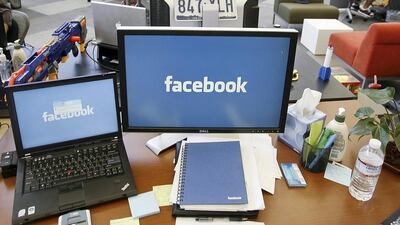When the year draws to a close, Facebook will begin its second decade as a free service for anyone aged 13 or older in almost every part of the world. Some might fervently hope it never gets to its 30th birthday, or at least not like Atlas, carrying the world on its shoulders.
Facebook, a for-profit business that has become the world’s most popular social network, is now faced with responsibilities that would be impossible for any one entity – private or public sector – to competently discharge.
In 2017 and beyond, Facebook is expected to keep its 1.79 billion monthly active users both well-informed and well-meaning. It has to provide a platform for the news its users want to read or share but also to appropriately flag content to warn them away from malicious lies. Finally, Facebook itself – a platform for largely user-generated content – must be seen as impartial but never inaccurate.
That to-do list would be impossible for any international entity – imagine the ructions over a United Nations version of Facebook – much less for a relatively young business primarily concerned with its balance sheet. And yet, the expectations are breathtaking in scope and also puzzlingly hopeful.
After Facebook’s recent promise to combat the plague of fake news by partnering with fact-checking sites such as Snopes, PolitiFact, FactCheck.org and ABC, a leading German politician suggested that self-regulation would be insufficient and the long arm of the law might prove an additional reminder of Facebook’s social responsibilities. Thomas Oppermann, chairman of Germany’s Social Democratic Party, raised the prospect of legislation to ensure that companies such as Facebook set up an office in country to deal 24/7 with fake news and hate speech. When an offending item is identified, it would have to be deleted within 24 hours or lead to a €500,000 (Dh1.91m) fine. A bill to order Facebook to compensate people who’ve been affected by defamatory stories is to be introduced in the German parliament next year.
The subtext of Germany’s political ferment over Facebook is its forthcoming national elections. There are fears that Russia will use Facebook to affect voter sentiment, along the lines of alleged Kremlin-directed activity in last month’s US presidential election.
The fears are understandable. The response is not. If Germany genuinely believes that Facebook is serving, even unwittingly, as a channel of malign influence, why not go the way of China and block it? The same question might be asked of The Netherlands, France, in fact of almost any other western country with upcoming elections and a restive far-right, which uses social media networks such as Facebook to spread the word.
It is entirely likely that a German (and Dutch, and French) move against Facebook would force it to restrict content for those geographies, just as it has previously done for Pakistan, Russia and Turkey. According to some estimates, Facebook blocked 55,000 pieces of content in 20 countries in the five months from July 2015. When the US Senate’s Republican-led commerce committee officially demanded answers from Facebook about alleged manipulation of its “trending news” sidebar against right-wing sites, the network threw up its hands. Clearly, if threatened with being kept out of a domain, or restricted in its ambit, Facebook will cave.
But surely that is neither the point nor the objective. The issue at hand is the enormous power over our thought processes and our politics now said to be wielded by one entity, and the incessant calls for its founder, Mark Zuckerberg, to act in the hybrid avatar of secular pope, digital caped crusader and New Age UN secretary-general.
Calls for corporate social responsibility are all very well when limited to the sugar content of popular soft drinks or the portion sizes of multinational fast food chains. But it is ridiculous to expect Facebook, a business governed by page views – the digital equivalent of peep show tickets – to subvert its instincts.
Facebook works, as digital expert Frederic Filloux puts it, through a “walled wonderland”, a deeply fragmented universe deliberately designed to be this way. Mr Filloux, who edits Monday Note, an authoritative newsletter covering the transformation of digital news media, describes Facebook’s global network as follows: “Dozens of millions of groups carefully designed to share the same views and opinions. Each group is protected against ideological infiltration from other cohorts. Maintaining the integrity of these walls is the primary mission of Facebook’s algorithm.”
Page-sharing volumes, he points out, come from content that is emotional (cat looking at a horror movie), fun (listicles), proximate and of affinity to users.
Does that sound like anyone’s daily newspaper or national public news broadcast?
No, and nor does Facebook want us to believe it is. As Adam Mosseri, its vice-president product management for news feed, pointed out earlier this year: “Our aim is to deliver the types of stories we’ve gotten feedback that an individual person most wants to see.”
There we have it. Facebook will give its consumers what they want. That’s how it makes money.
So why do disparate governments, legislators and perfectly sensible experts of different stripes still appear to believe that Facebook needs to knit the world together while protecting it from itself?
Facebook was never ordained in the role of global fact-provider. Until September 2006, you and I could not sign up for an account. There was a world that existed perfectly well before Facebook. Perhaps it is time to reimagine it.
Rashmee Roshan Lall is a writer on world affairs
On Twitter: @rashmeerl


